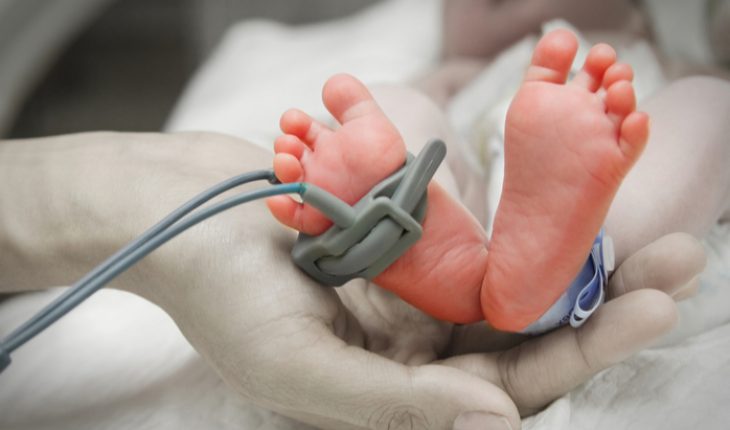COVID-19 infection in pregnancy is not associated with stillbirth or early neonatal death, according to a new study.
However the research, from over 4000 pregnant women with suspected or confirmed COVID-19, also found women who had a positive test were more likely to have a premature birth.
The research, led by scientists from Imperial College London and published in the journal Ultrasound in Obstetrics and Gynecology, used data from the UK and the USA.
The study team looked at data from 4004 pregnant women who had suspected or confirmed COVID-19. Of these women, 1606 were from the UK, from a data registry called PAN-COVID, while 2398 were from the US, from the American Academy of Pediatrics SONPM data registry.
PAN-COVID was funded by the Medical Research Council, UK National Institute for Health Research and the NIHR Imperial Biomedical Research Centre.
All the women gave birth between January-August 2020.
The research found that no babies died from COVID-19 in the study. There was also no increase in risk of stillbirth or low birth weight.
However, both the UK and US data suggested a higher risk of pre-term birth (defined as birth before 37 weeks).
In the UK data, 12 per cent of women with suspected or confirmed COVID-19 had a pre-term delivery – 60 per cent higher than the national average rate of 7.5 per cent. In the US data, 15.7 per cent of women had a pre-term birth, 57 per cent higher than the US national average of 10 per cent.
The study team say part of this association may be due to doctors deciding to deliver the baby early due to concerns about the effect of COVID-19 infection on mother and baby. The rate of spontaneous pre-term birth was lower than expected.
Professor Christoph Lees, senior author of the study from Imperial’s Department of Metabolism, Digestion and Reproduction, said: “The finding that COVID-19 infection does not increase the risk of stillbirth or baby death is reassuring. However, a suspected or confirmed COVID-19 diagnosis was linked to a higher risk of preterm birth, and it isn’t entirely clear why.”
Dr Ed Mullins, co-author from Imperial’s Department of Metabolism, Digestion and Reproduction, added: “This study supports the prioritisation of vaccination for women who are pregnant or who plan to become pregnant, and existing measures that protect women in pregnancy from infection, in order to reduce pre-term birth.”
The proportion of babies born to mothers with confirmed COVID-19, and who subsequently tested positive for the SARS-CoV-2 virus (which causes COVID-19) was 2 per cent in the UK study, and 1.8 per cent in the US study.
The majority of women in the study had no pre-existing conditions such as diabetes or a respiratory condition such as asthma.
In the UK study eight of the women died, while four women died in the US study.
The study team say that although these death rates are higher than expected for women giving birth, they are similar to the expected death rates seen among adults with a confirmed COVID-19 infection. This suggests that women in pregnancy are not at a higher risk of death from COVID-19 than non-pregnant women.
Among women in the UK arm of the study, 66.5 per cent were European or North American, 1.9 per cent were Middle Eastern, 1.1 per cent were North African, 4.2 per cent were African south of the Sahara or Caribbean, 7.5 per cent were from the Indian subcontinent, and 9.2 per cent were South East Asian. Among the US arm of the study 37 per cent were white, 25 per cent were Black or African, 4.1 per cent were Asian, 0.4 per cent were American Indian or Alaska Native American.
Professor Fiona Watt, Executive Chair of Medical Research Council, which helped fund the study, said: “It is obviously critical to understand how COVID-19 affects different groups of people. We’re proud to have funded the present study in which, for the past year, researchers have monitored the health of a substantial number of pregnant women and their babies. The study’s findings, that there is no increased risk of stillbirth and early neonatal death in women who contracted COVID-19 while pregnant, are reassuring. However, the study highlights the need for more research to determine if, or how, COVID-19 affects maternal outcomes or premature birth.”
The American Academy of Pediatrics SONPM data registry was led by Professor Mark Hudak.
The Centre for Trials Research at Cardiff University was responsible for building the online database, data management and the statistical analyses. Julia Townson, Senior Research Fellow and co-author from Cardiff University said: “I am delighted that the Centre for Trials Research at Cardiff University has been able to collaborate with Imperial College London on this important research. It has been a mammoth undertaking by the team, requiring a rapid build of the database and web page, as well as cleaning and analysing the data.”
- Gut microbiome could delay onset of type 1 diabetes - 3rd April 2025
- The da Vinci 5 Robot Is Set To Transform Bariatric Care: - 31st March 2025
- Beyond money: the hidden drivers fuelling child food insecurity - 31st March 2025






